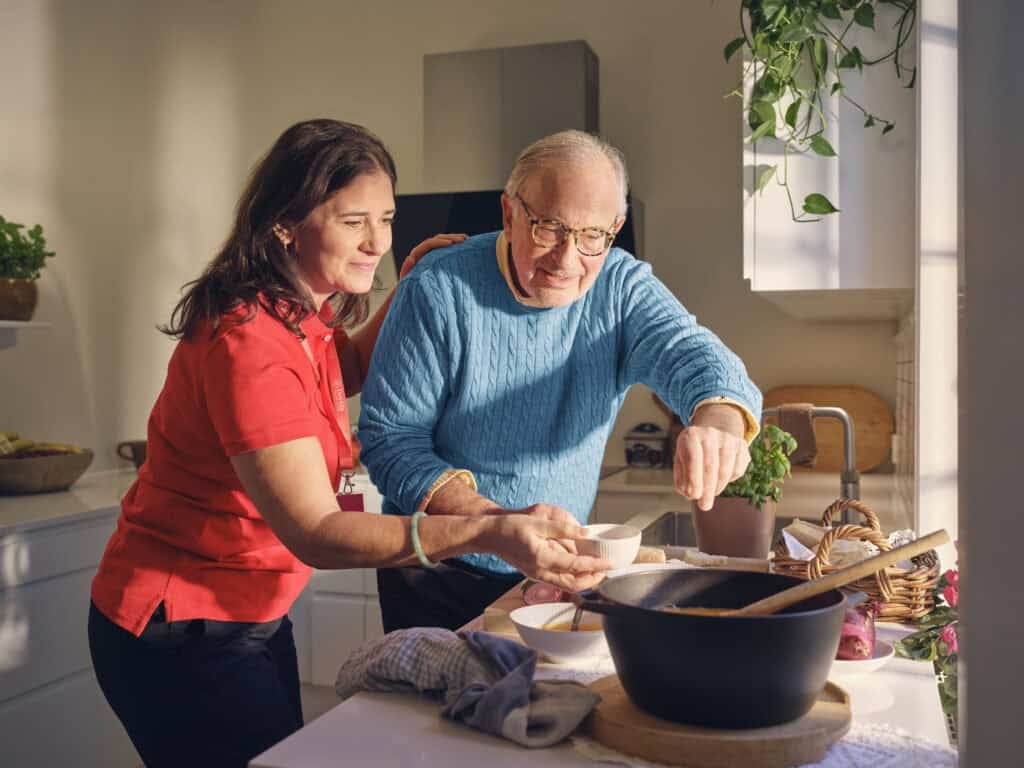Blog
28 October 2025
Why Social Connection Matters as We Age
Social connection isn’t just about having a pleasant chat – it’s fundamental to our health and wellbeing. Yet one in five older Australians are socially isolated. Understanding the impact of loneliness and knowing how to stay connected can make a real difference to quality of life.
The Real Impact of Social Isolation
The effects of loneliness extend far beyond feeling a bit down. Research shows that isolation and loneliness can increase the risk of heart disease, stroke, anxiety, depression, and dementia. People experiencing loneliness are also more likely to skip meals more frequently, which can affect overall health and nutrition.
Social connection helps keep your brain stimulated and can help prevent cognitive decline, including memory loss. When we’re connected to others, we feel validated and experience a sense of belonging – both crucial elements for good mental health.
The challenge is that when you’re feeling lonely, it can be difficult to reach out and be sociable, even though connecting with others is exactly what’s needed. Changes in mobility, memory, or sensory abilities may lead to gradually distancing from social circles, which can contribute to loneliness, depression, and other physical health issues.
Building Resilience Through Connection
Social interactions are one of five key activities that, when practised three to four times a week, can lead to better mental health. Regular contact with friends and family provides validation and a sense of belonging. These connections don’t have to be complicated – a phone call, a shared cup of tea, or a walk together can be just as valuable as more elaborate social activities.
Practical Strategies for Staying Connected
There are many ways to maintain and build social connections, and finding what works for you is key:
Join group activities. Local councils often offer a range of activities for older people, either free or for a small cost. Consider a dance or fitness class, yoga, aqua aerobics, or meditation. Group exercise not only keeps you physically active but provides regular social interaction.
Pursue hobbies and interests. Build social connections into the things you already enjoy. Whether it’s gardening, painting, singing, or joining the local bowls club, shared interests provide natural conversation starters and opportunities for regular interaction. Playing cards, attending quiz nights, or playing bingo with friends combines mental stimulation with social connection.
Learn something new. Libraries often offer education programmes including computer classes, whilst hardware stores might run DIY or gardening sessions. Learning alongside others creates a shared experience and opportunity for connection.
Consider a pet. Pets provide companionship and unconditional love, can help with exercise routines, and serve as a conversation starter with other animal lovers.
Get crafty or creative. Find a local painting, drawing, knitting, or flower arranging group. Creative activities provide both mental stimulation and social interaction.
Volunteer. Contributing to your community through volunteering can provide purpose and regular social contact.
Join community groups. Organisations like Men’s Sheds, Country Women’s Associations, and Rotary clubs offer structured opportunities for regular social interaction and community involvement.
Technology Tips for Staying Connected
Technology can be a wonderful tool for maintaining connections, especially with family and friends who live far away. Video calls through platforms like Zoom, Skype, or FaceTime allow you to see loved ones’ faces and feel more connected than a phone call alone.
Tablet devices can be particularly useful. They’re portable, user-friendly, and can be used for video calls, emails, and social media. Playing online games like Words with Friends or crosswords can help support cognitive function whilst connecting with others.
For those new to technology, many libraries and community centres offer free or low-cost classes to help you get started. Don’t hesitate to ask family members or friends for help – most people are happy to share their knowledge, and learning together can be a bonding experience in itself.
Smart speakers like Amazon Echo or Google Nest can help with everyday tasks, especially if reduced mobility makes it harder to get around. They can help with turning on lights, setting medication reminders, and telling the time – all without having to move from your chair.
How Companionship Care Can Help
Sometimes you might need a little help to maintain social connections with others. This is where professional companionship services can make a meaningful difference.
At Dovida, companionship is more than having someone present – it’s about building meaningful connections. Regular visits from a familiar caregiver can help you feel engaged and maintain quality of life. Our caregivers are matched to your values and interests, making conversations and activities more enjoyable and authentic.
Companionship support might include:
- Conversation and social interaction in your home
- Accompanying you to social activities or community events
- Transport to coffee dates with friends or family visits
- Support with hobbies and interests you enjoy
- Assistance with staying connected through technology
Our transport services can help you get to appointments, shopping, and social outings safely and on time. This removes barriers that might otherwise prevent you from attending social activities or maintaining connections with friends, family and the community.
At Dovida, our Circle of Care creates meaningful connections that empower you to live your life, your way. We work in partnership with you, your family, and your healthcare professionals to provide a holistic support system centred around your needs and preferences.
Taking the First Step
If you’re experiencing loneliness or are concerned about a loved one who seems isolated, reaching out for support is a positive step. Our Care Managers can discuss your individual situation and explore how Dovida’s companionship and transport services might help you maintain the social connections that matter to you.
Remember, feeling connected to others is vital for quality of life and both mental and physical wellbeing. You deserve to feel engaged, valued, and connected to your community – and we’re here to help make that possible.
